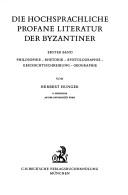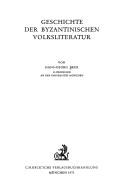| Listing 1 - 10 of 36 | << page >> |
Sort by
|

ISBN: 3487044501 3487044498 348704448X 3487044528 348704451X 3487044536 3487044544 9783487044491 9783487044507 9783487044484 9783487044521 9783487044514 Year: 1972 Publisher: Hildesheim: Olms,
Abstract | Keywords | Export | Availability | Bookmark
 Loading...
Loading...Choose an application
- Reference Manager
- EndNote
- RefWorks (Direct export to RefWorks)
877.3 --- Byzantijnse literatuur --- 877.3 Byzantijnse literatuur
Book
ISBN: 9607099648 9789607099648 Year: 1998 Publisher: Athènes: Académie d'Athènes,
Abstract | Keywords | Export | Availability | Bookmark
 Loading...
Loading...Choose an application
- Reference Manager
- EndNote
- RefWorks (Direct export to RefWorks)
877.3 --- 877.4 --- Byzantijnse literatuur --- Nieuwgriekse literatuur --- 877.4 Nieuwgriekse literatuur --- 877.3 Byzantijnse literatuur
Book
ISBN: 9782873650384 2873650389 Year: 2022 Publisher: Bruxelles Société des Bollandistes
Abstract | Keywords | Export | Availability | Bookmark
 Loading...
Loading...Choose an application
- Reference Manager
- EndNote
- RefWorks (Direct export to RefWorks)
Romylos, originally called Rajko, was born in Vidin (a town on the southern bank of the Danube in Bulgaria) around 1310 into a Byzantine-Bulgarian family and died in the monastery of Ravanica (Serbia) around 1380. He was one of the most brilliant followers of the Hesychast tradition in the Eastern Orthodox Church in the 14th century. The monk Romylos, like many other Bulgarian monks, emigrated to neighbouring Orthodox countries: he stayed successively in Tarnovo, Paroria, Mount Athos, and finally in Valona and Ravanica. His tomb can still be seen in the church of the monastery in Ravanica.The Life of Romylos was written in Greek during the 1380’s by Gregory, one of his disciples on Mount Athos; there is also a Slavonic translation of the text. The Life recounts Romylos’ journey to the Balkans, and is one of the main sources documenting the famous ‘school’ founded by Gregory the Sinaitic in Paroria.The new Subsidia Hagiographica contains the critical edition of the Greek text (with Italian translation) and the Slavonic text. The book is destined to become the reference work for anyone interested in St Romylos and the religious history of the Balkans in the 14th century.
877.3 --- 949.5 <092> --- 949.5 <092> Geschiedenis van Byzantium en Griekenland--Biografieën --- Geschiedenis van Byzantium en Griekenland--Biografieën --- 877.3 Byzantijnse literatuur --- Byzantijnse literatuur --- Byzantijnse literatuur --- Geschiedenis van Byzantium en Griekenland--Biografieën

ISBN: 3406014275 3406014283 9783406014277 9783406014284 Year: 1978 Volume: 5/1-2 12/5/1-2 Publisher: München: Beck,
Abstract | Keywords | Export | Availability | Bookmark
 Loading...
Loading...Choose an application
- Reference Manager
- EndNote
- RefWorks (Direct export to RefWorks)
Medieval Greek literature --- Byzantine literature --- Littérature byzantine --- History and criticism. --- Histoire et critique --- 877.3 --- Byzantijnse literatuur --- 877.3 Byzantijnse literatuur --- Histoire et critique.
Book
ISBN: 9782503564562 2503564569 Year: 2015 Publisher: Turnhout: Brepols,
Abstract | Keywords | Export | Availability | Bookmark
 Loading...
Loading...Choose an application
- Reference Manager
- EndNote
- RefWorks (Direct export to RefWorks)
The twenty Poems of Theodore Metochites (ca. 1270-1332) constitute a unique corpus of approximately 10.000 verses composed in the traditional Homeric hexameter. Metochites did not use the most common iambic verse, but chose to commemorate his deeds and immortalize his thoughts and experiences in the heroic Homeric verse. At the same time he took advantage of the poetic works of Gregory of Nazianzus, who exercised a considerable influence upon his language and his general attitude towards his fellow men and his social environment. The poems of Metochites, both in their entirety and each one of them separately, are a curious mixture of various genres (autobiography, ekphrasis, letter, hagiographical praise), which testify to their author's wide range of interests and his bold attempt to renovate the traditional patterns of Byzantine poetry. Some poems are addressed to his friends (e.g. Nikephoros Kallistos Xanthopoulos or Leo Vardales), but most of them are addressed to the author himself. Metochites was quite pessimistic about the situation of the state and of his own affairs, and gave expression to his inner feelings of frustration and sadness in a rather unrestrained manner. Most of these poems had been published in the past, but their editions are either difficult to obtain or inadequate. In the introduction the editor sketches a balanced portrait of Metochites as a poet, underlining both his merits and his limitations.
Classical Greek literature --- Christian saints - Biography --- Holy Spirit --- Christian poetry, Greek --- Poésie chrétienne grecque --- 877.3 --- 877.3 Byzantijnse literatuur --- Byzantijnse literatuur --- Christian saints
Book
ISBN: 9783110221299 9783110221305 3110221292 1282722913 3110221306 9786612722912 Year: 2010 Volume: 23 Publisher: Berlin: de Gruyter,
Abstract | Keywords | Export | Availability | Bookmark
 Loading...
Loading...Choose an application
- Reference Manager
- EndNote
- RefWorks (Direct export to RefWorks)
Manuscripts, Greek (Medieval and modern) --- Orthodox Eastern Church --- Liturgy --- Texts --- History and criticism --- Codex Lesbiacus Leimonos 11 --- 877.3 --- 877.3 Byzantijnse literatuur --- Byzantijnse literatuur --- Manuscripts, Medieval --- Texts. --- History and criticism. --- Codex Lesbiacus Leimonos 11. --- Ménées grecs
Book
ISBN: 8811475066 9788811475064 Year: 1989 Volume: 1 Publisher: Milano: Garzanti,
Abstract | Keywords | Export | Availability | Bookmark
 Loading...
Loading...Choose an application
- Reference Manager
- EndNote
- RefWorks (Direct export to RefWorks)
Greek literature --- Byzantine literature --- Greek literature, Modern --- Littérature grecque --- Littérature byzantine --- Littérature grecque moderne --- History and criticism --- Bibliography --- Histoire et critique --- Bibliographie --- 877.3 --- 875 <01> --- -Byzantine literature --- -Greek literature, Modern --- -Neo-Greek literature --- Romaic literature --- Greek literature, Byzantine --- Greek literature, Medieval and late --- Balkan literature --- Classical literature --- Classical philology --- Greek philology --- Byzantijnse literatuur --- Griekse literatuur--Bibliografieën. Catalogi --- -Bibliography --- -Byzantijnse literatuur --- 875 <01> Griekse literatuur--Bibliografieën. Catalogi --- 877.3 Byzantijnse literatuur --- -877.3 Byzantijnse literatuur --- Neo-Greek literature --- Littérature grecque --- Littérature byzantine --- Littérature grecque moderne --- History and criticism&delete& --- Bibliography. --- Greek literature - History and criticism - Bibliography --- Byzantine literature - History and criticism - Bibliography --- Greek literature, Modern - History and criticism - Bibliography
Book
ISBN: 3891040520 9783891040522 Year: 1997 Publisher: Wiesbaden: Aula,
Abstract | Keywords | Export | Availability | Bookmark
 Loading...
Loading...Choose an application
- Reference Manager
- EndNote
- RefWorks (Direct export to RefWorks)
Medieval Latin literature --- Medieval Greek literature --- Byzantine literature --- Classical literature --- Christian literature, Early --- History and criticism. --- 877.3 --- 871 <031> --- Byzantijnse literatuur --- Latijnse literatuur--Encyclopedieën. Lexica --- 871 <031> Latijnse literatuur--Encyclopedieën. Lexica --- 877.3 Byzantijnse literatuur --- Byzantine literature - History and criticism. --- Classical literature - History and criticism. --- Christian literature, Early - History and criticism. --- Antiquité tardive --- Patrologie --- Littérature byzantine
Book
ISBN: 9782503544120 2503544126 Year: 2016 Volume: 80 Publisher: Turnhout: Brepols,
Abstract | Keywords | Export | Availability | Bookmark
 Loading...
Loading...Choose an application
- Reference Manager
- EndNote
- RefWorks (Direct export to RefWorks)
Nicephorus Blemmydes was born as the second son of a doctor in Constantinople at the very end of the twelfth century. In December 1224 he was ordained lector by patriarch Germanus II, which marked the beginning of a successful career in the Church, culminating in the foundation of his own monastery near Ephesus. Teaching, both on theological and secular topics, played a major part in his life as well. Among his pupils were George Acropolites and the future emperor Theodore II Lascaris. In order to instruct his fellow monks in his monastery, Blemmydes wrote, among other things, four brief treatises, entitled De fide, De virtute et ascesi, De anima and De corpore, each of which may originally have been part of his Typikon, but has also been circulating independently. Up to now, only the De anima has been decently edited.This volume presents the first critical edition of the De virtute et ascesi of Nicephorus Blemmydes, previously only available in the, at several places deficient, edition of 1784 by Dorotheos Voulismas. The Greek text is preceded by a detailed analysis of the manuscript tradition. Special attention is also given to the indirect tradition of this ethical treatise. The reason is that Nicephorus' treatise has been included in full in the Synopsis Variarum Disciplinarum by the philosopher-monk Joseph Rhacendytes (ca. 1260-1330). The main difference is the addition by Joseph of a passage from the opuscule Ad sanctissimum presbyterum Marinum of Maximus the Confessor (CPG 7697.1) after the introductory part of Blemmydes’ De virtute et ascesi. Also Joseph’s De virtute is presented here for the first time in a critical edition.
Classical Greek literature --- Virtue --- Christian ethics --- Christian literature, Byzantine. --- Vertus --- Morale chrétienne --- Littérature chrétienne byzantine --- Early works to 1800. --- History --- Ouvrages avant 1800 --- Histoire --- Christian saints --- Holy Spirit --- Christian poetry, Greek --- Bible --- Criticism, Textual --- Manuscripts --- 877.3 --- Byzantijnse literatuur --- 877.3 Byzantijnse literatuur --- Morale chrétienne --- Littérature chrétienne byzantine --- Christian saints - Biography

ISBN: 3406014208 9783406014208 Year: 1971 Volume: 12/2/3 2/3 Publisher: München: Beck,
Abstract | Keywords | Export | Availability | Bookmark
 Loading...
Loading...Choose an application
- Reference Manager
- EndNote
- RefWorks (Direct export to RefWorks)
Byzantine literature --- Littérature byzantine --- History and criticism. --- Histoire et critique --- History and criticism --- Empire byzantin --- Civilisation --- 877.3 --- 931 --- Byzantijnse literatuur --- Oude geschiedenis--in het algemeen --- 931 Oude geschiedenis--in het algemeen --- 877.3 Byzantijnse literatuur --- Littérature byzantine. --- Histoire et critique. --- Civilisation. --- Byzantine literature - History and criticism
| Listing 1 - 10 of 36 | << page >> |
Sort by
|

 Search
Search Feedback
Feedback About UniCat
About UniCat  Help
Help News
News